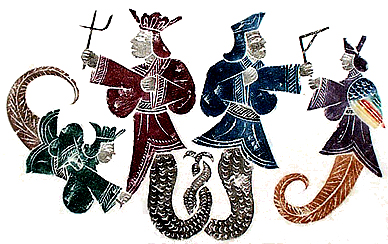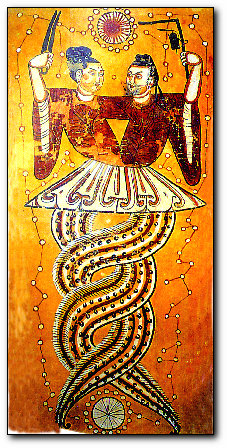
I’ve been working with the “ball” material I wrote about in the last post and I’ve decided that there is an other way to explain it.
The top predators I’m likely to see in San Francisco on any given day are falcons, hawks, cats, and raccoons. Occasionally I see a coyote or a heron too.
All of these predators are able to fluff up their bodies. We tend to think of these moments of fluffing up as autonomic responses to fear because they parallel the goose bumps we get when we are watching a horror movie. We also learn in school that some animals fluff up so that they will look really big to an attacker or a competitor, and that has a parallel in the expression “I feel pumped up” which athletes sometimes use.
But of course we don’t know for sure why these predators fluff up and we definitely don’t know whether or not they consciously control it.

I used the term
autonomic above. The nervous system is divided into two types of nerves, the ones that control obviously voluntary actions (yes that would include ear wiggling even if you aren’t very good at it yet); and nerves that control much less voluntary things like pupil size and heart rate. The less voluntary system is called the autonomic nervous system and it is
also divided into two parts. One part that is active when you take a deep relaxing breath while sitting in a hot tub,
and another part that is active when you hold your breath, tense up your muscles, pull back your lips and grit your teeth.
The relaxing nervous system is called para-sympathetic, the stressed out nervous system is called sympathetic. (I know the names are ridiculous, they refer to anatomy you only see when you are doing a dissections.)
The ball practice that I wrote about yesterday is the practice of making your whole body fluff up and its opposite, shrink-condense. This happens at the most outer layer of the physical body, between the muscles and the hair follicles.
In this practice it is key that you keep your breathing relaxed, that you do not activate the stressed out nervous system even a little bit. Through this practice you will eventually be able to do more than just fluff up and shrink-condense. You will be able to spontaneously change the entire surface of your body in any way you want.
I suspect that the top predators are able to do this without becoming stressed out, while prey, like bunny rabbits, only do it when they are stressed out.
This kind of practice has lots of health benefits but the fighters out there may be thinking, “How could I possibly fight using such a subtle mechanism?” The answer is that the practice trains your body to not get stuck, to keep changing even in a situation of stress. It will increase your power too, because there will be less inhibition in your body.
And of course when the predator ball becomes second nature, you don’t think about it, it just becomes part of everything you do.
The following Hagiography is from
To Live As Long As Heaven and Earth:"During the reign of Emperor Cheng of the Han, hunters in the Zhongnan Mountains saw a person who wore no clothes, his body covered with black hair. Upon seeing this person, the hunters wanted to pursue and capture him, but the person leapt over gullies and valleys as if in flight, and so could not be overtaken. [But after being surrounded and captured, it was discovered this person was a 200 plus year old woman, who had once been a concubine of Qin Emperor Ziying. When he had surrendered to the 'invaders of the east', she fled into the mountains where she learned to subside on 'the resin and nuts of pines' from an old man. Afterwards, this diet 'enabled [her] to feel neither hunger nor thirst; in winter [she] was not cold, in summer [she] was not hot.']
The hunters took the woman back in. They offered her grain to eat. When she first smelled the stink of grain, she vomited, and only after several days could she tolerate it. After little more than two years of this [diet], her body hair fell out; she turned old and died. Had she not been caught by men, she would have become an [immortal]." (Campany 2002:22–23)
"The earliest representations of Chinese immortals,
xian (?), dating from the
Han Dynasty, portray them flying with feathery wings (the word
yuren ?? "feathered person" later meant "Daoist") or riding dragons."
[Thanks Wikipedia, for saving me from having to type these two quotes in myself!]
 I’ve been working with the “ball” material I wrote about in the last post and I’ve decided that there is an other way to explain it.
I’ve been working with the “ball” material I wrote about in the last post and I’ve decided that there is an other way to explain it. I used the term autonomic above. The nervous system is divided into two types of nerves, the ones that control obviously voluntary actions (yes that would include ear wiggling even if you aren’t very good at it yet); and nerves that control much less voluntary things like pupil size and heart rate. The less voluntary system is called the autonomic nervous system and it is also divided into two parts. One part that is active when you take a deep relaxing breath while sitting in a hot tub, and another part that is active when you hold your breath, tense up your muscles, pull back your lips and grit your teeth. The relaxing nervous system is called para-sympathetic, the stressed out nervous system is called sympathetic. (I know the names are ridiculous, they refer to anatomy you only see when you are doing a dissections.)
I used the term autonomic above. The nervous system is divided into two types of nerves, the ones that control obviously voluntary actions (yes that would include ear wiggling even if you aren’t very good at it yet); and nerves that control much less voluntary things like pupil size and heart rate. The less voluntary system is called the autonomic nervous system and it is also divided into two parts. One part that is active when you take a deep relaxing breath while sitting in a hot tub, and another part that is active when you hold your breath, tense up your muscles, pull back your lips and grit your teeth. The relaxing nervous system is called para-sympathetic, the stressed out nervous system is called sympathetic. (I know the names are ridiculous, they refer to anatomy you only see when you are doing a dissections.)